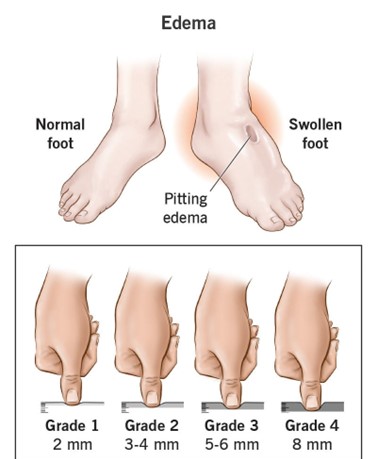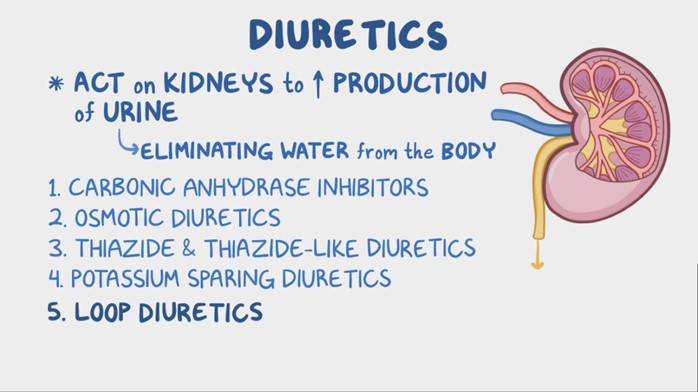A nurse is caring for a client who has heart failure and has gained 2 kg (4.4 lB. over the last 24 hours. Which of the following interventions should the nurse take?
Reduce the client's sodium intake.
Restrict the client's protein intake.
Weigh the client once per week.
Provide the client with three large meals per day.
The Correct Answer is A
Choice A reason: Reducing the client's sodium intake is an appropriate intervention for the nurse to take because it can help prevent fluid retention and edema, which are complications of heart failure. Sodium intake should be limited to 2 g per day or less for clients who have heart failure.
Choice B reason: Restricting the client's protein intake is not an appropriate intervention for the nurse to take because it can cause malnutrition and muscle wasting, which can worsen heart failure. Protein intake should be adequate to meet the client's nutritional needs and support cardiac function. Protein intake should be about 0.8 to 1.2 g per kg of body weight per day for clients who have heart failure.
Choice C reason: Weighing the client once per week is not an appropriate intervention for the nurse to take because it can delay the detection and treatment of fluid overload, which can worsen heart failure. The client should be weighed daily at the same time and with the same scale and clothing to monitor fluid status and adjust medication dosage.
Choice D reason: Providing the client with three large meals per day is not an appropriate intervention for the nurse to take because it can increase the workload of the heart and cause dyspnea, fatigue, or chest pain, which are symptoms of heart failure. The client should be provided with small, frequent meals that are low in sodium, fat, and cholesterol to reduce cardiac stress and promote digestion.

Nursing Test Bank
Naxlex Comprehensive Predictor Exams
Related Questions
Correct Answer is A
Explanation
Choice A reason: Navy beans and ham are good sources of potassium, which can help prevent hypokalemia, a common side effect of some diuretics. Hypokalemia can cause muscle weakness, cramps, fatigue, and cardiac arrhythmias.
Choice B reason: Cheddar cheese is high in sodium, which can cause fluid retention and increase blood pressure. Sodium intake should be limited when taking diuretics, as they can also cause hyponatremia, a condition of low sodium levels in the blood.
Choice C reason: Beef broth is also high in sodium, which can have the same effects as cheddar cheese. In addition, beef broth is high in purines, which can increase uric acid levels and cause gout, another possible side effect of some diuretics.
Choice D reason: Baked potato is high in carbohydrates, which can raise blood glucose levels and worsen diabetes, a risk factor for hypertension. Some diuretics can also cause hyperglycemia, a condition of high blood glucose levels in the blood.

Correct Answer is C
Explanation
Choice A reason: Limiting high-calorie supplements to between meals is not a good strategy for managing anorexia while receiving radiation therapy because it can reduce the appetite and intake of regular meals, which are more nutritious and balanced. High-calorie supplements should be used as an addition to, not a replacement for, regular meals.
Choice B reason: Avoiding overeating during 'good' days is not a good strategy for managing anorexia while receiving radiation therapy because it can cause discomfort, nausea, or vomiting, which can worsen anorexia and affect the tolerance of radiation therapy. Eating should be based on hunger and satiety cues, not on good or bad days.
Choice C reason: Consuming nutrition-dense foods first is a good strategy for managing anorexia while receiving radiation therapy because it can ensure adequate intake of calories, protein, vitamins, and minerals, which are essential for healing and recovery. Nutrition-dense foods are those that provide high amounts of nutrients per serving, such as eggs, cheese, nuts, beans, and meat.
Choice D reason: Eating hot foods rather than cold foods is not a good strategy for managing anorexia while receiving radiation therapy because it can irritate the mouth and throat, which may be inflamed or sore due to radiation therapy. Cold foods are more soothing and refreshing for the mouth and throat, such as ice cream, yogurt, smoothies, and popsicles.
Whether you are a student looking to ace your exams or a practicing nurse seeking to enhance your expertise , our nursing education contents will empower you with the confidence and competence to make a difference in the lives of patients and become a respected leader in the healthcare field.
Visit Naxlex, invest in your future and unlock endless possibilities with our unparalleled nursing education contents today
Report Wrong Answer on the Current Question
Do you disagree with the answer? If yes, what is your expected answer? Explain.
Kindly be descriptive with the issue you are facing.
